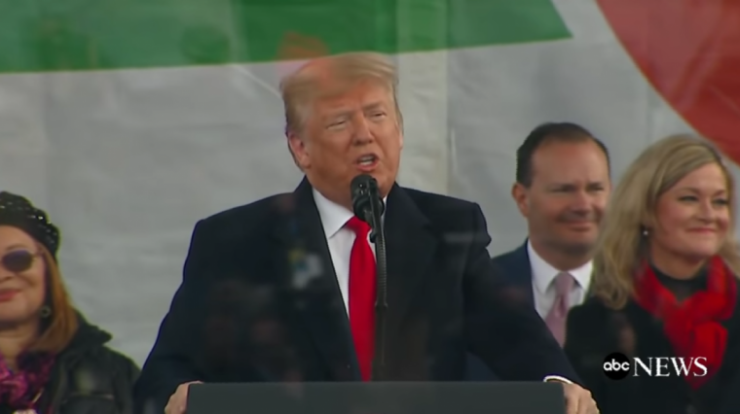
President Donald Trump signed an executive order last Tuesday instructing the U.S. State Department to prioritize international religious freedom in its implementation of foreign policy and budget $50 million per year toward the advancement of religious freedom.
The new order on "advancing international religious freedom" contains a number of instructions for the State Department and federal agency heads when it comes to promoting religious freedom abroad.
"Religious freedom, America's first freedom, is a moral and national security imperative," the executive order reads. "Religious freedom for all people worldwide is a foreign policy priority of the United States, and the United States will respect and vigorously promote this freedom."
Among other things, the order gives Secretary of State Mike Pompeo 180 days to consult with the administrator of the U.S. Agency for International Development to "develop a plan to prioritize international religious freedom in the planning and implementation of U.S. foreign policy and in the foreign assistance programs of the Department of State and USAID."
The order also states that Pompeo will direct chiefs of missions in countries that are included on the State Department's list of "countries of particular concern" for international religious freedom violations and the religious freedom "special watch list," to develop "comprehensive action plans to inform and support the efforts" of the U.S. government "to encourage the host governments to make progress in eliminating violations of religious freedom."
The order calls for the State Department to work with the Department of the Treasury to develop "recommendations to prioritize the appropriate use of economic tools" to advance religious freedom in countries of particular concern or on the special watch list.
Such economic tools can include "increasing religious freedom programming, realigning foreign assistance to better reflect country circumstances, or restricting the issuance of visas."
The tools can also include sanctions under the Global Magnitzky Act, which allows the U.S. to target perpetrators of human rights abuses through the seizure of U.S. assets or travel bans.
As religious freedom advocates have long called for State Department officers to take religious freedom concerns more seriously, the president is ordering that all State Department foreign affairs civil service employees go through training every three years on international religious freedom, as described in the Frank R. Wolf International Religious Freedom Act of 2016.
"Within 90 days of the date of this order, the heads of all agencies that assign personnel to positions overseas shall submit plans to the President, through the Assistant to the President for National Security Affairs, detailing how their agencies will incorporate the type of training," the orders read.
Under Section 3, Trump's order stipulates that the State Department and USAID need to budget at least $50 million per fiscal year for "programs that advance international religious freedom, to the extent feasible and permitted by law and subject to the availability of appropriations."
According to the order, such programs should include those that "anticipate, prevent, and respond to attacks against individuals and groups on the basis of their religion," as well as programs that "help ensure that such groups can persevere as distinct communities."
The programs should "ensure equal rights and legal protections for individuals and groups regardless of belief," "improve the safety and security of houses of worship and public spaces for all faiths" and "preserve the cultural heritages of religious communities."
"Executive departments and agencies that fund foreign assistance programs shall ensure that faith-based and religious entities, including eligible entities in foreign countries, are not discriminated against on the basis of religious identity or religious belief when competing for federal funding, to the extent permitted by law," the order explains.
Trump's signing of the order follows the president's visit to the Saint John Paul II National Shrine in Washington, D.C., earlier in the day. Pope John Paul II was a vigorous defender of religious freedom.
On Monday evening, Trump's visited and took photos outside to the historic St. John's Church, which was burned rioters Monday evening.
Johnnie Moore, an evangelical communications executive who has served as an informal adviser to the administration and as a commissioner on the U.S. Commission on International Religious Freedom, called the order "historic" and "partly meant to confront a resurgent communism" typified by China's Communist Party.
Sean Nelson, lead counsel for the international religious freedom advocacy group ADF International, called the order "huge."
"A lot of great things in the #InternationalReligiousFreedom exec order," Nelson tweeted. "Greater flexibility for using econ tools, like sanctions & realignment of foreign assistance — $50 million for #IRF programming — Chiefs of Missions have to develop #IRF plans for their countries, greater training."
USCIRF Vice Chair Gayle Manchin, the wife of Democrat West Virginia Sen. Joe Manchin, said in a statement that the bipartisan commission has long called on the U.S. government to develop an "overall strategy for promoting religious freedom abroad" and "country-specific action plans."
"[W]e welcome the fact that this Executive Order requires the State Department and USAID to do exactly that," Manchin said. "We also appreciate the express reference to U.S. officials working for the release of religious prisoners of conscience, which is a high priority for USCIRF."
Courtesy of The Christian Post




